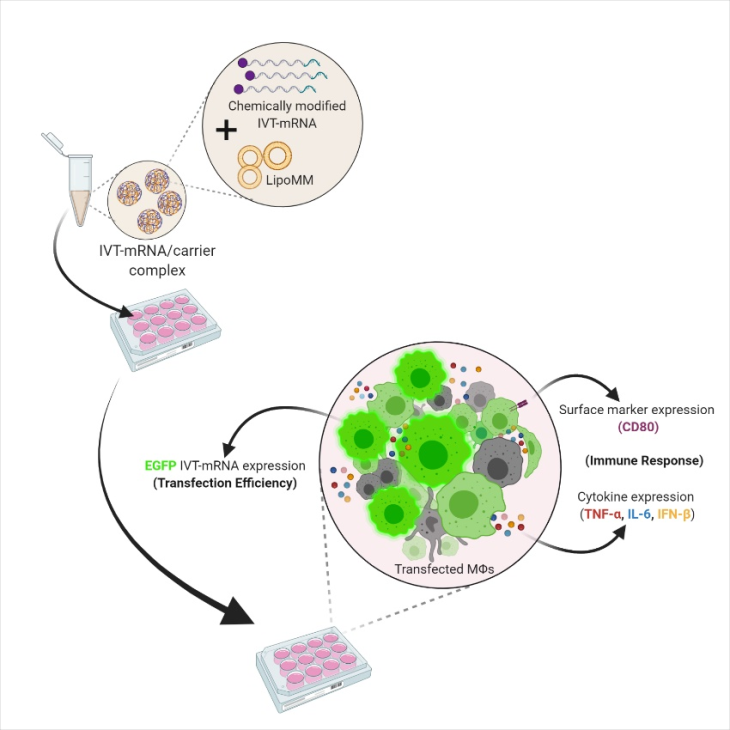Immune responses to mRNA
Synthetic mRNA produced in the laboratory can trigger a natural immune response in human immune cells like macrophages. In many applications, such cell activation is detrimental, but chemical mRNA modifications emerged as a promising tool to provide control over immune response levels. Researchers of Helmholtz-Zentrum Hereon and Berlin-Brandenburg Center for Regenerative Therapies (BCRT), together with Charité - Universitätsmedizin Berlin, University of Potsdam and University Hospital of the Ruhr-University Bochum, have analyzed the responses of macrophages to synthetic mRNA with various chemistries. The study was published in the journal "Molecular Therapy - Nucleic Acids".

´Transfection of primary human macrophages and subsequent cellular response analysis, including transfection efficiency as well as immune activation (Moradian, H., Roch, et al., Molecular Therapy - Nucleic Acids (2022).
Proteins control and execute countless tasks in the human body. For example, they enable the contraction of our muscles, help transport essential substances from the environment into the cell, or form antibodies and thus serve our immune system. The blueprints for endogenous proteins are stored in DNA within the cell nucleus, where they are enzymatically converted (transcribed) into mRNA - or messenger RNA. mRNAs are exported from the cell nucleus to the cytoplasm, where they are read (translated) by ribosomes, enabling them to produce the encoded proteins, i.e. , the information stored in the blueprint is ultimately realized. mRNA can be synthesized and modified in the laboratory by a process called “in vitro transcription”, making this IVT-mRNA an attractive alternative to recombinant virus- and protein-based medicines.
Modification of macrophages by IVT-mRNA
While IVT-mRNA as a tool for genetic engineering is easy to produce, lacks genotoxicity and can be efficiently delivered to cells, its propensity to trigger unintended, inflammatory immune responses is a major challenge for its clinical application. Cells - in particular immune cells such as macrophages - detect IVT-mRNA as potential “danger” signal, or simply speaking: they mistake synthetic mRNA as an invading virus. Advances in IVT technology can pave the way to address such issues. For instance, chemical modifications of IVT-mRNA proved instrumental to modulate features such as stability, immune response as well as the level of protein production. This study explored the efficacy of various terminal and internal modifications of IVT-mRNA in an in vitro model system based on primary human macrophages.

Photo: Hereon/ Lisa Depenbrock
Some of the chemical modifications studied, especially those of the mRNA building block uridine, resulted in high protein production levels, while only eliciting negligible inflammatory responses. "Our work provides guidelines to uncouple protein production from immune activation. In perspective, our results thus contribute to the prediction of cell responses, which in turn are relevant for a wide range of therapeutic applications - from triggering controlled immunogenicity in mRNA vaccines to completely abrogating cell activation in protein replacement therapies," says Hanieh Moradian.
Publication
- Chemical modification of uridine modulates mRNA-mediated proinflammatory and antiviral response in primary human macrophages Moradian, H. et al.
https://doi.org/10.1016/j.omtn.2022.01.004
Contact
Communication and Media
Helmholtz-Zentrum Hereon
